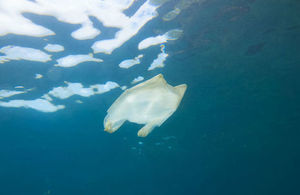Global commitment at United Nations Assembly to reduce pollution
The UK is one of a number of nations to sign a resolution to help reduce the amount of plastic in the world's seas.

Pledges to tackle marine litter and combat antimicrobial resistance have been adopted by countries around the world, including the UK, at this year’s United Nations Environment Assembly in Nairobi
Pledges to tackle marine litter and combat antimicrobial resistance have been adopted by countries around the world, including the UK, at this year’s United Nations Environment Assembly in Nairobi, which came to a close yesterday.
The UK has long been leading the way in improving the marine environment and yesterday, UN Member States agreed to work together to tackle this problem by reducing the amount of plastic and litter in the world’s oceans.
Under the agreement, an international taskforce will advise how to combat marine litter – an issue the UN’s oceans chief has described as a ‘planetary crisis’ - in a bid to tackle the eight million tonnes of plastic making their way into our oceans every year.
Environment Minister Therese Coffey said:
Countries around the world need to take urgent action to stop plastic entering our oceans and I am delighted that today’s UN agreement clearly demonstrates our shared commitment.
At home, the UK continues to be a world leader in tackling this issue – taking nine billion plastic bags out of circulation with our 5p carrier bag charge and drawing up one of the world’s toughest bans on microbeads.
A commitment to help tackle antimicrobial resistance (AMR) was also agreed among UN Member States as part of a resolution on environment and health. This consolidated support for existing progress made on AMR through the work of various UN agencies and others; highlighted the need to further understand the impact of AMR on the environment; and formally commissioned the UN Environment Programme to produce a report on the environmental impacts of AMR, including the causes for development and spread of resistance in the environment.
Member States are also being encouraged to consider putting in place measures to manage waste and waste water, including manufacturers of antibiotics where applicable, in order to minimise antimicrobial pollution.
UK officials were instrumental in negotiating the new international commitments on marine litter and antimicrobial resistance. These resolutions were adopted by all UN Member States and will be instrumental in shaping international action on these key issues.